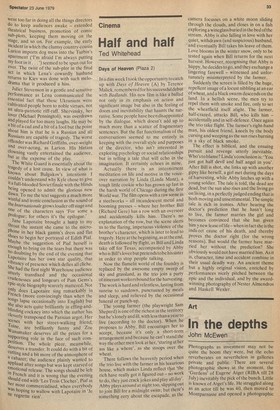Cinema
Half and half
Ted Whitehead
Days of Heaven (Plaza 2) In a dim week I took the opportunity to catch up with Days of Heaven (A) by Terence Malick, remembered for his successful debut with Badlands. His new film is like a ballad not only in its emphasis on action and significant image but also in the feeling of doom and inevitability that haunts the narrative. Some people have been disappointed by the dialogue, which doesn't add up to much more than a scatter of fragmentary sentences. But the flat functionalism of the conversations seemed to me entirely in keeping with the overall style and purposes of the director, who isn't interested in exploring psychology or social relationships but in telling a tale that will echo in the imagination. It certainly echoes in mine. Actually there is an intermittent meditation on life and motive in the voiceover narration by Linda (Linda Manz), a tough little cookie who has grown up fast in the harsh world of Chicago during the first World war. The film opens with a raw scene in a steelworks — all incandescent metal and booming presses — where her brother Bill (Richard Gere) has a row with an overseer and accidentally kills him. There's no explanation of the row, but the scene alerts us to the flaring, impetuous violence of the brother's character, which is later to lead to tragedy. Here at the beginning, as at the end, death is followed by flight, as Bill and Linda take off for Texas, accompanied by Abby who is Bill's lover but pretendsto be his sister in order to stop people talking.
Now the flamelit world of the foundry is replaced by the awesome empty sweep of sky and grassland, as the trio join a party of itinerant workers bound for the harvesting. The work is hard and relentless, lasting from sunrise to sundown, punctuated by meals and sleep, and relieved by the occasional funeral or punch-up. The young farmer (the playwright Sam Shepard) is one of the richest in the territory but he's lonely and ill, with less than a year to live (according to the doctor). When he proposes to Abby, Bill encourages her to accept, because it's only a short-term arrangement and because he can't stand the way the other men look at her, 'staring at her ass like a whore', as she stoops over the wheat. There follows the heavenly period when the trio live with the farmer in his luxurious house, which makes Linda reflect that 'the rich have really got it figured out — no work to do, they just crack jokes and play all day'. Abby plays around at night too, slipping out• to join Bill for a midnight swim; but there's something eery about the escapade, as the camera focusses on a white moon sliding through the clouds, and closes in on a fish exploring a wineglass buried in the bed ofthe stream. Abby is also falling in love with her quiet, withdrawn (and suspicious) husband, ' and eventually Bill takes his leave of them. Love blooms in the winter snow, only to be tested again when Bill returns for the next harvest. However, recognising that Abby is happy, he decides to go, and they exchange a lingering farewell — witnessed and unfortunately misinterpreted by the farmer.
Suddenly the screen is filled by the huge, repellent image of a locust nibbling at an ear of wheat, and a black swarm descends on the land. In a hellish scene, the men try to repel them with smoke and fire, only to set the wheatfield itself alight. The farmer, • half-crazed, attacks Bill, who kills him — accidentally and in self-defence. Once again the trio take flight. The farmer's right-hand man, his oldest friend, kneels by the body cursing and weeping as the sun rises burning in a sky of black smoke.
The effect is biblical, and the ensuing pursuit and revenge utterly inevitable. Who's to blame? Linda's conclusion is: 'You just got half devil and half angel in you'. After Bill is shot, she links up with another gipsy like herself, a girl met during the days of harvesting, while Abby latches up with a young soldier. The tale is told, the dead are dead, but the sun also rises and the living go on living, in a perfectly judged ending that is both moving and unsentimental. The simple tale is rich in ironies. After hearing the doctor's prediction that he hasn't long to live, the farmer marries the girl and becomes convinced that she has given him new lease of life— when in fact she is the indii ect cause of his death, and thereby proves the doctor right (for the wrong reasons). But would the farmer have married her without the prediction? She Obviously would not have married him. As it is, character, time and accident combine in their usual deadly way. An ancient theme but a highly original vision, enriched by performances nicely pitched between the epic and the individual, and by the awardwinning photography of Nester Almendros and Haskell Wexler.










































 Previous page
Previous page